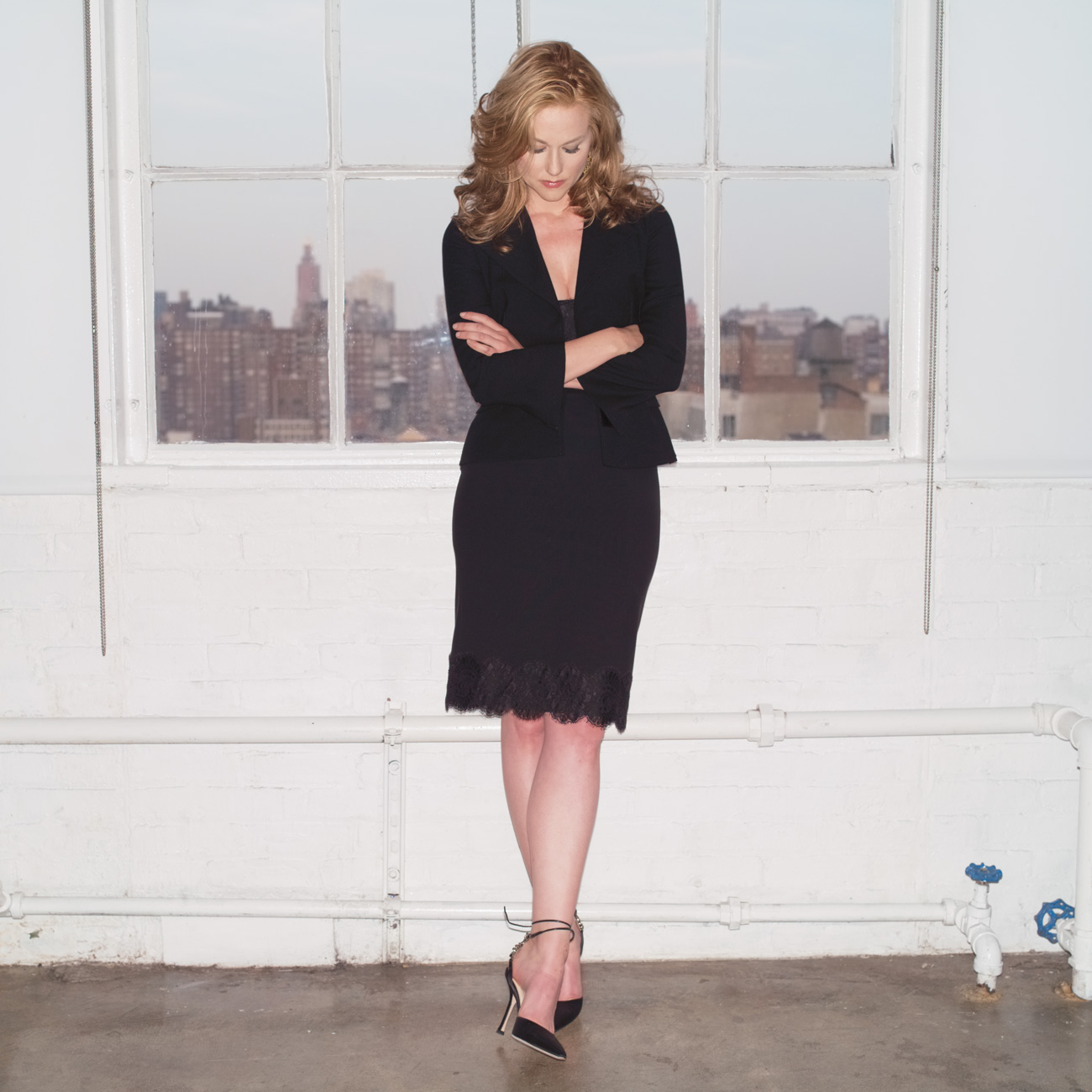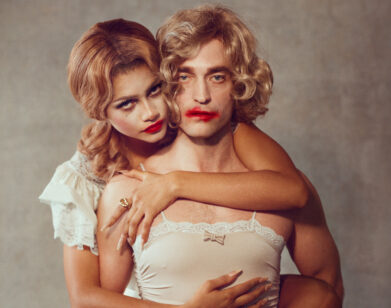Laura Linney

Whether onstage or onscreen, Laura Linney specializes in confounding expectations. With her warm, honey-dipped voice and approachable beauty, it’s easy to mistake her as simply the friendly heart of whatever project she’s involved in-that is, until those sunny layers are peeled away and an infinitely more complex persona is revealed, one that invariably nails a host of all-too-human emotions (her Lady Macbeth moment in last year’s Mystic River being a prime example). It’s no wonder, then, that she’s been acknowledged from the outset with glowing reviews and a variety of honors, not least of which was her Academy Award nomination for her role as an empathetic single mom in Kenneth Lonergan’s You Can Count on Me [2000]. With two new Linney vehicles in theaters-P.S., which came out in October, and Kinsey, which should be unspooling just as this issue hits the stands-her brand of sorcery has been on ample display in recent months. Here, she speaks with her You Can Count on Me co-star, Matthew Broderick.
Laura Linney wears a jacket by RALPHâ??LAUREN COLLECTION. Top by H&M
Matthew Broderick: Can you tell our readers a little bit about Kinsey and how it came about?
Laura Linney: Sure! Kinsey is based on the life of Alfred Kinsey, who was the famous sex re-searcher responsible for the Kinsey Reports. Bill Condon wrote the script. It took a very long time to come together-four years from the time they first called me to when we started working. I’ve got to say, it was one of the best experiences I’ve ever had, and the subject matter is fascinating.
MB: Liam Neeson plays Alfred Kinsey, right?
LL: Yes. I don’t know if you’ve ever worked with someone onstage for a long time and then done a movie with them right after, but it’s fantastic. Liam and I had just done The Crucible on Broad-way when we started filming, which was great because we were so relaxed. You know each other so well that you forget you’re in a movie.
MB: What made Kinsey such a remarkable guy?
LL: We forget how sexually conservative our country was just one or two generations ago, and Kinsey’s research was responsible for liberating the country from its puritanical views of sexuality. There was an enormous amount of misinformation. People just didn’t know anything about sex, so they were terrified of it. Kinsey came along with information that really led to the sexual revolution of the ’60s. Without him, none of us would have had sex education in school. He did all this research in the ’40s, and the country just exploded-some with shock and horror, some with jubilation-in reaction to the information he gathered and published.
MB: Wasn’t there a scandal involving him a few years ago?
LL: Yeah. There’s a small chapter in one of his books that deals with sexuality and preadolescents; that information was gathered through a variety of interviews with a number of individuals, among them a pedophile who is portrayed briefly in the movie as a character called Kenneth Braun. Kinsey used research in his own work that this man provided him with that is extremely explosive and volatile. It led some people to quite wrongly attach the label of pedophile onto Kinsey himself. Was Kinsey a complicated man? Yes. Was he a pedophile? No.
Laura Linney wears a jacket by RALPHâ??LAUREN COLLECTION. Top by H&M
MB: Well, I can’t wait to see the film. Okay, I’m going to ask you some very traditional questions now. When did you think, Maybe I’ll be an actor?
LL: I was young, probably 7 or 8, but it took me a really long time to admit it. I was very shy about it, and I sort of kept my mouth shut. I would get embarrassed when I heard people go, “I want to be an actress!” It was unfair of me, and I don’t know where that came from, but I sort of felt that saying that was something you had to earn. So I worked backstage for a while, and when I was 14 and 15, I was a technical apprentice at summer theater. Later on, in high school, I really stepped forward and said I’m at least going to work on this and see if acting is a possibility for me.
MB: That’s what happened with me.
LL: I think it’s because we both had parents who were in the business [Linney’s father is playwright Romulus Linney. Broderick’s father was actor James Broderick; his mother was actor and artist Patsy Broderick]. We watched them struggle and we watched them do well, so we sort of knew what the contract was.
MB: Right, you know it’s hard, so you’re not just going to flippantly say, “I’m going to be a movie star.” Now, when you’re preparing for a role, how much research do you do? I mean, if you were going to play a stockbroker, would it help you to sell stocks?
as fantastic as our lives are, things get complicated at times, so there are certainly moments when you wish your life were different.Laura Linney
LL: It always depends on the material. There’s some material that will absorb that sort of work really well, and then there’s other stuff that just won’t. I feel the talent is trying to figure out when to do it and when not to. You Can Count on Me seems very simple in many ways, but I remember doing an enormous amount to prepare for it. Because it was so well written, it could hold so much. There were hints in every single sentence, and you just filled them out. And then there are other roles that I literally just won’t touch in terms of preparation.
MB: I once read a quote about an actor-I think it was Walter Huston-describing how he portrayed a baseball player in the theater in the 1920s, and that even though he had never played baseball or liked it much, once he put on that uniform and walked out onstage, he was a baseball player. He just had this ability to get into any mind-set or period.
LL: There was something that his human mechanism instinctively understood. That’s an actor’s instincts. They can be really powerful.
MB: I see that same talent in you. I’ve seen you in so many periods, playing so many types of people, and it never looks like work.
LL: Thank you, Matthew! You know, I just really enjoy it. I was not a great student at school, but I’m good at being that kind of student because I enjoy it. I enjoy learning about different periods and people, and then taking what’s universal about the human condition and seeing where it matches up. No matter where you are, certain things unite everybody.
MB: I’m asking you the same annoying questions that people ask me, but do you find acting in a play very different from acting in a movie?
LL: Completely. The basic laws of good acting are the same, but everything about the experience is different-your job responsibility, the time you spend on it. What I love about a play is that it’s such an investment because only time can create a lot of what happens onstage. And I really believe it takes about three months for a show to gel: No matter how good or how prepared you are, there are certain things that only time can take care of-it’s like it has to cook. The satisfaction you get from that is different from the satisfaction you get from film. The other thing I love about theater is the friendships you make and what you learn doing it. I believe that no matter what you do in life, if you learn the basics through theater, it will help you in everything else-problem solving, communication, discipline, all of that stuff.
MB: I’ve always loved the atmosphere. Even as a kid at my father’s plays, I liked being backstage. I liked watching the play, but I also loved having to be quiet and that weird atmosphere in a dressing room while a play is going on.
LL: Well, it’s that group effort of a lot of people focused on one thing. It’s human chemistry-there’s something fascinating about watching that go on.
MB: Have you ever thought about a different line of work? Like, “If I hadn’t made the decision to be an actor, maybe I’d be a botanist or a dental hygienist”?
LL: As you know, as fantastic as our lives are, things get complicated at times, so there are certainly moments when you wish your life were different. That’s true for everybody, not just people in our profession. But there’s nothing I feel like I gave up professionally. I’m absolutely doing what I enjoy.






